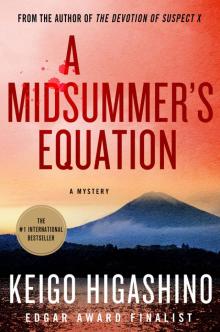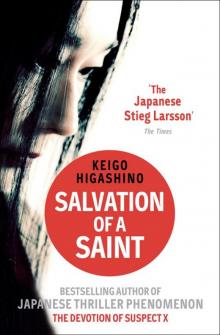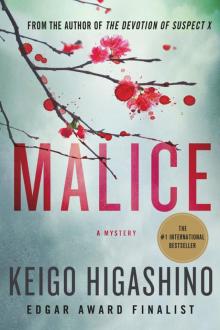- Home
- Keigo Higashino
Newcomer Page 4
Newcomer Read online
Page 4
“Appreciate it. Appreciate it. Keep the change.”
“Okay.” Shuhei inclined his head slightly. The change was all of fifty yen.
“Remember, this is a secret. Not a word to anyone. You got that?” Taiji placed his index finger up against his lips.
“Yes, I know.”
“Don’t breathe a word to anyone. I’ll never forgive you if you do.”
“I said I wouldn’t, didn’t I?”
“Good. We’re both on the same page, then.” Clutching the plastic bag, Taiji walked off toward the main street. Shuhei sighed quietly as he watched him go.
Starting at six o’clock, the restaurant had a steady stream of customers. Shuhei was a server; he brought the food from the kitchen. The cooks provided him with a brief explanation of each dish, what the ingredients were and how it should be eaten. Nonetheless, he often found himself at a loss when customers asked him anything too finicky. When they did, he would have to make his way back to the kitchen and ask his fellow cooks or the owners for additional information. Nine times out of ten they reproached him for not having listened properly the first time around.
When regular customers came to dine, Yoriko would make a point of greeting them in person. She always wore a kimono. Shuhei knew that there were rules governing what kimono to wear in what season and that Yoriko followed those rules very scrupulously. That night, she was wearing a lilac kimono made of semitransparent fabric.
The sight of Yoriko chatting to the customers mesmerized Shuhei. Her face became animated and she appeared far younger and more beautiful than normal. Shuhei couldn’t believe that she was almost the same age as his mother.
The restaurant’s patrons were the only people to whom she displayed her captivating smile. The instant she turned away from their table, her eyes hardened.
“What are you standing around daydreaming for? Can’t you see that the glass of that gentleman over by the window is empty?”
“Oh … uh … sorry.”
Shuhei had to jump to it every time Yoriko made a sharp comment.
By ten o’clock, the customers started to go home. Shuhei couldn’t help feeling pleased when they thanked him for the delicious dinner on their way out, despite his not having had a hand in the cooking.
Then it was time for tidying up. Shuhei was responsible for washing the dishes and scrubbing down the kitchen. Since he had only joined the restaurant in the spring, he hadn’t yet learned even how to handle a carving knife. Katsuya, another apprentice who had started two years before him, had only just recently been permitted to help out with the cooking. Shuhei would have to put up with his present duties for a while yet.
He was only seventeen years old. He’d been in high school until last year, but somehow never settled into the rhythm of school. No, that was putting a gloss on the truth; the fact was that he wasn’t able to keep up with his classmates and got frustrated. He’d never wanted to go to college, but his parents had begged him to at least complete high school, so reluctantly he’d tried. In the end, and to no one’s great surprise, he simply couldn’t hack it.
After he dropped out of high school, his parents started asking him what he planned to do with his life. His answer—that he wanted to become a chef—was off the top of his head. The reason for it was simple enough: there was a sushi restaurant near the family home, and Shuhei had always thought the chefs working there were the last word in cool. His father used his connections to get him the Matsuya job.
Having finished the cleaning and tidying, Shuhei was about to leave when Taiji wandered in, wearing the same outfit he’d had on in the afternoon. He must have been out all evening.
“How’d we do tonight?” Picking up one of the glasses that Shuhei had just washed, Taiji opened a nearby bottle of sake.
“Same old, same old. Oh, Professor Okabe was here.”
“Oh yeah? The great self-styled gourmet who tragically lacks any sense of taste?” Taiji poured himself a glass of sake and took a sip. His face was already purple. Must have been doing some serious boozing, thought Shuhei.
Taiji drank the rest of the sake and put the empty glass down on the table. “Cheers, that was delicious,” he said, and left the room.
What was that about? Are you just trying to make my job harder than it is already? thought Shuhei, sulking as he reached for Taiji’s dirty glass.
2.
Matsuya offered a reasonably priced lunch that was popular with the better-heeled workers from nearby office buildings.
Shuhei was hard at work waiting tables when Katsuya, the senior apprentice, came up to him.
“The boss is asking for you. She wants you in the Cypress Room.”
Shuhei wondered what it was all about. The Cypress Room was never used at lunchtime.
When he got there, Shuhei found Yoriko and a group of three men sitting on opposite sides of the table. Two of the men were in suits, while the third was more casually dressed in a short-sleeved checked shirt over a T-shirt.
“These gentlemen are from the police, Shuhei. Detectives, they tell me. They want to ask you a few questions,” Yoriko explained.
“Sorry, I know this is a busy time of day,” said the man in the short-sleeved shirt. He swung back around to Yoriko. “If you don’t mind, ma’am, we’d like to talk to the young man alone.”
“Be my guest,” said Yoriko. For all her winning smile, there was a trace of uneasiness in her eyes. Shuhei was baffled. Why on earth did the police want to talk to him?
The three men filed out of the room and headed for the front door of the restaurant. Shuhei followed. They went outside, stopping when they got to Ningyocho Boulevard.
Ningyocho Boulevard was a broad, multilane one-way street lined with all sorts of restaurants and bars.
“God, it’s hot today. Want a nice drink?” The detective in the checked shirt thrust a plastic carrier bag in Shuhei’s direction. Inside were several cans of cold coffee.
“I’m good, thanks.”
“Don’t say that. If you don’t have one, then neither can we.”
“Really?” Shuhei peered into the bag and took out a can. The three detectives then did likewise.
“Do you have draught beer at Matsuya?”
Shuhei shook his head.
“No, only bottled, but it’s a craft beer we get directly from a brewery in Hida, in Gifu Prefecture.”
“Sounds good. Go on, drink up.”
“Sure,” replied Shuhei, pulling the tab on the can. It was only June, but the heat was already intense. The cool liquid seemed to seep into every pore of his body.
“Heard you bought a bunch of ningyo-yaki recently?” began the older-looking of the two men in suits, after taking a swig of his coffee. Ningyo-yaki were small snack cakes, baked in molds—a Tokyo specialty.
Shuhei almost choked. “What?” Blinking, he looked back at the detective.
“You bought a bunch of snack cakes at a shop on this street three days ago, didn’t you?” reiterated the detective, staring into Shuhei’s eyes.
Shuhei’s heart started racing. He couldn’t very well lie straight to a cop’s face.
“Yes, I did.”
“What time was that?”
“A little before four.”
“Good. How many did you buy?”
“Ten. Seven with sweet bean paste filling, three without.”
“Did the shop pack them in a wooden box?”
“No. Just a see-through plastic container.”
“A present for someone?”
Shuhei shook his head and nervously licked his lips. His promise to Taiji flashed through his mind. “No, I bought them for myself.”
“Really? Ten of the darn things?” the shorter of the two detectives wearing suits asked, his eyes widening in surprise.
“I ate some that afternoon and polished the rest off that night.”
The other detective in a suit gave a sardonic smile. “You youngsters!”
“You really ate the whole lot yourself?” asked the shorter one.
“Ye … yes.”
“What did you do with the plastic container?”
“I threw it away.”
“Where?”
“Uhm…” Shuhei was getting flustered. He wasn’t sure how to parry that question. “Don’t remember. Some bin or other, I guess.”
“The boss told us that you live above the restaurant. Was it in the bin in your room there?”
“Maybe … or, no, I think it was another bin somewhere else.”
“Try to remember. We really need to find the thing.”
“The plastic container?”
“That’s right.” The detective’s eyes drilled into Shuhei.
Shuhei lowered his gaze. He was in trouble. The easy way out would be to come clean and tell the cops he’d bought the small cakes for the owner, but then he’d be hauled over the coals by Taiji. Who knows, he might even get fired.
A second later, he had a flash of inspiration. He looked up.
“I put my trash out today.”
The dismay in the detectives’ faces was visible.
“What, this morning? With all the other garbage?” asked the shorter detective.
“That’s right. Today’s the day they come around.”
That, at least, was the truth. Putting out the trash was one of Shuhei’s responsibilities.
The two detectives in suits exchanged unhappy looks. By contrast, the third detective, the one in the short-sleeved shirt, was glancing up and down the street in an easygoing way. When he noticed Shuhei looking at him, he shot him a grin. “Go on. Drink your coffee.”
“Oh, yeah.” Shuhei drank the last of his coffee. He was surprised how thirsty he was.
“Okay, good. Thanks for your time,” said the shorter detective.
&
nbsp; “Yes, thanks for helping with the investigation.”
The detective in the checked shirt was holding out the plastic bag to Shuhei. “I’ll throw that away for you.”
“Oh … uh … thanks.” Shuhei dropped his empty can in the bag.
Yoriko was waiting just outside the main entrance when Shuhei got back to the restaurant.
“How did it go? What did they want to know?” she asked.
Shuhei hemmed and hawed, unable to improvise a convincing story off the cuff.
“Was it about the snack cakes?” she asked.
Taken aback, Shuhei nodded. The police must have told Yoriko what they planned to question him about.
“You bought some small cakes three days ago and they wanted to know what you’d done with them, right?”
“Yes, ma’am.”
“What did you say?”
Shuhei repeated the story he had told the detectives. What else could he do?
He was expecting Yoriko to yell at him for ducking out to buy sweets during working hours, but instead she just inquired what else the police had asked him about.
“Nothing else.”
“I see. Well, hurry up and get back to work.”
“Yes, ma’am. What’s this all about, though? I mean, what do the detectives want with me?”
Yoriko looked slightly uncomfortable.
“Three days ago, in the evening, there was a murder over in Kodenmacho. The police are looking into it.”
“In Kodenmacho? What’s that got to do with me?”
“Apparently, the police found some small cakes in the woman’s apartment. They’re looking for anyone who bought some that day.”
Shuhei gasped. Suddenly the roof of his mouth felt dry and a wave of heat surged through him. He tried to conceal his shock.
“How did they find out that I’d bought some?” Shuhei muttered. His voice was hoarse.
“Goodness knows. They didn’t go into detail with me. Anyway, you’ve got nothing to do with any murder, have you?”
Shuhei shook his head frantically. “I didn’t even know that there’d been a murder.”
“Well then, you’ve got nothing to worry about, have you? Go on, enough dawdling. Back to work. We mustn’t inconvenience our customers.” Yoriko’s tone was stern.
“Sorry, ma’am,” said Shuhei. With an apologetic duck of the head, he headed back to the kitchen.
After lunch was over, Shuhei had a short break. He discreetly went looking through the stack of old newspapers and found a story on the murder in the evening edition from the day before yesterday. The victim was a woman of forty-five living alone in Kodenmacho who’d been strangled in her apartment. Based on the crime scene, the police thought that she probably knew her killer. They also thought that it was highly likely that the crime had taken place sometime between late afternoon and early evening.
Snack cakes weren’t mentioned in the article. The police were probably keeping that detail from the public.
A bead of sweat dribbled from his armpit as Shuhei pictured the faces of the detectives who had questioned him.
Shuhei was familiar with the rumors about Taiji, Yoriko’s husband, having a woman on the side. He’d heard his coworkers gossiping. They’d even said something about him having set her up in an apartment in Kodenmacho.
Three days ago was hardly the first time that Taiji had had Shuhei buy a batch of small sweet cakes for him. As soon as Shuhei gave him the cakes, Taiji would head out somewhere. Taiji didn’t go toward the subway station; it was more in the opposite direction. If you walked in that direction for ten minutes or so, you’d end up in Kodenmacho.
Shuhei had always assumed that the cakes were a present for Taiji’s girlfriend.
And now there’d been a murder in Kodenmacho. And they had found the same sort of cakes he’d bought that afternoon in the victim’s apartment.
Shuhei prayed that the whole thing was nothing more than an unfortunate coincidence—but there were too many coincidences for comfort. And the detectives had come to talk to him specifically, when there had to be hundreds of customers who bought those cakes from that particular shop on any given day.
Was it Taiji’s lover who’d been murdered? That would mean … Shuhei’s imagination was running wild, but he had no one to confide in. Mistress Yoriko was out of the question, as were his coworkers. He wondered about talking to Taiji, but he quickly abandoned the idea. He’d only get yelled at: “How dare you accuse your own boss of being a murderer!”
All the worrying kept him from concentrating on his work. He made countless small slipups that night and was subjected to repeated tongue-lashings from his coworkers and the head cook.
3.
The following evening, the detective in the checked shirt showed up at the restaurant. This time, he was wearing a charcoal gray jacket and was there as a customer. After leading him to his table, Shuhei went back to check the reservation list. The detective’s name was Kaga.
“Hah, you look like you’ve seen a ghost,” said Kaga merrily. “I suppose you think an underpaid cop like me has no business coming to a swanky joint like this?”
“Of course not, sir.” Shuhei lowered his eyes.
“Think I’ll start off with one of those Hida craft beers,” said Kaga, without bothering to consult the drink menu. He obviously remembered their conversation from the day before.
In the evenings at Matsuya, they served from a prix fixe menu only. Shuhei first brought Kaga his beer, together with an amuse-bouche, then began to serve the appetizers. Kaga asked for the drink menu.
“The mistress’s sake pairing menu looks interesting. Think I’ll go for that.”
“Yes, sir.”
“Hey, have you got a sweet tooth?” Kaga asked as Shuhei was about to head to the kitchen.
Shaking his head vigorously, Shuhei was on the verge of saying no, when he recalled his claim to have eaten an entire box of snack cakes by himself.
“Yes … uh … I quite like sweet things.”
“Funny that you went for the no-sugar option, then.”
“The no-sugar option?”
“The canned coffee.” Kaga drank down the last of his beer. “You chose the can of sugar-free.”
Shuhei gave a start. Kaga was right. Out of habit, he had gone for the sugar-free coffee.
“Coffee’s different … I prefer it without sugar.”
“Oh, do you?” Kaga put his empty glass down on the table. “All right, let’s get started on the sake.”
“On the double, sir,” said Shuhei and went off.
What’s that detective fellow on about now? Who cares about a stupid can of coffee?
Shuhei had broken out in a cold sweat. He knew that Kaga hadn’t really come to the restaurant just to have dinner. The detective hadn’t believed his story about eating all the snack cakes himself and was there to subject him to another round of questions.
There was no one he could turn to for help. He had no choice: he had to wait on the detective.
“This sake is from Akita Prefecture. It’s called Rokushu,” explained Shuhei, pouring a measure from a small earthenware bottle into a sake cup, which he had placed in front of Kaga. “It’s a carbonated sake. The bubbles come from its being fermented twice.”
“Delicious,” said Kaga, after taking a sip. “It reminds me of champagne. Is it made the same way?”
“I … uhm … think so, yes. They put yeast in junmai-shu—that’s sake made without any added alcohol or sugar—and then referment it.”
“With champagne, they add a little sugar along with the yeast. How about with this sake?”
“Co … could you wait a moment, sir? I need to go and ask someone.”
“It doesn’t matter. You can tell me later. I wanted to ask if you’d heard about the murder in Kodenmacho?”
Despite his best efforts, Shuhei couldn’t prevent his eyes widening at this unexpected and direct question. Kaga smiled smugly. “It seems that you have,” he said.
“What about it?”
“Your boss probably told you that we found some snack cakes at the crime scene. Our guess is that the victim was enjoying them at the time of her murder. We found some of the same cake undigested in her stomach, as well as some in a plastic container on the table. The trouble is, we don’t know who purchased them.”
“It wasn’t the victim?”
“No, unfortunately not. An insurance salesman visited the victim in her apartment prior to the murder. She offered him one, telling him that she’d just been given them. So we know that she got them from a third party.”
“Okay.” Shuhei inclined his head slightly. The change was all of fifty yen.
“Remember, this is a secret. Not a word to anyone. You got that?” Taiji placed his index finger up against his lips.
“Yes, I know.”
“Don’t breathe a word to anyone. I’ll never forgive you if you do.”
“I said I wouldn’t, didn’t I?”
“Good. We’re both on the same page, then.” Clutching the plastic bag, Taiji walked off toward the main street. Shuhei sighed quietly as he watched him go.
Starting at six o’clock, the restaurant had a steady stream of customers. Shuhei was a server; he brought the food from the kitchen. The cooks provided him with a brief explanation of each dish, what the ingredients were and how it should be eaten. Nonetheless, he often found himself at a loss when customers asked him anything too finicky. When they did, he would have to make his way back to the kitchen and ask his fellow cooks or the owners for additional information. Nine times out of ten they reproached him for not having listened properly the first time around.
When regular customers came to dine, Yoriko would make a point of greeting them in person. She always wore a kimono. Shuhei knew that there were rules governing what kimono to wear in what season and that Yoriko followed those rules very scrupulously. That night, she was wearing a lilac kimono made of semitransparent fabric.
The sight of Yoriko chatting to the customers mesmerized Shuhei. Her face became animated and she appeared far younger and more beautiful than normal. Shuhei couldn’t believe that she was almost the same age as his mother.
The restaurant’s patrons were the only people to whom she displayed her captivating smile. The instant she turned away from their table, her eyes hardened.
“What are you standing around daydreaming for? Can’t you see that the glass of that gentleman over by the window is empty?”
“Oh … uh … sorry.”
Shuhei had to jump to it every time Yoriko made a sharp comment.
By ten o’clock, the customers started to go home. Shuhei couldn’t help feeling pleased when they thanked him for the delicious dinner on their way out, despite his not having had a hand in the cooking.
Then it was time for tidying up. Shuhei was responsible for washing the dishes and scrubbing down the kitchen. Since he had only joined the restaurant in the spring, he hadn’t yet learned even how to handle a carving knife. Katsuya, another apprentice who had started two years before him, had only just recently been permitted to help out with the cooking. Shuhei would have to put up with his present duties for a while yet.
He was only seventeen years old. He’d been in high school until last year, but somehow never settled into the rhythm of school. No, that was putting a gloss on the truth; the fact was that he wasn’t able to keep up with his classmates and got frustrated. He’d never wanted to go to college, but his parents had begged him to at least complete high school, so reluctantly he’d tried. In the end, and to no one’s great surprise, he simply couldn’t hack it.
After he dropped out of high school, his parents started asking him what he planned to do with his life. His answer—that he wanted to become a chef—was off the top of his head. The reason for it was simple enough: there was a sushi restaurant near the family home, and Shuhei had always thought the chefs working there were the last word in cool. His father used his connections to get him the Matsuya job.
Having finished the cleaning and tidying, Shuhei was about to leave when Taiji wandered in, wearing the same outfit he’d had on in the afternoon. He must have been out all evening.
“How’d we do tonight?” Picking up one of the glasses that Shuhei had just washed, Taiji opened a nearby bottle of sake.
“Same old, same old. Oh, Professor Okabe was here.”
“Oh yeah? The great self-styled gourmet who tragically lacks any sense of taste?” Taiji poured himself a glass of sake and took a sip. His face was already purple. Must have been doing some serious boozing, thought Shuhei.
Taiji drank the rest of the sake and put the empty glass down on the table. “Cheers, that was delicious,” he said, and left the room.
What was that about? Are you just trying to make my job harder than it is already? thought Shuhei, sulking as he reached for Taiji’s dirty glass.
2.
Matsuya offered a reasonably priced lunch that was popular with the better-heeled workers from nearby office buildings.
Shuhei was hard at work waiting tables when Katsuya, the senior apprentice, came up to him.
“The boss is asking for you. She wants you in the Cypress Room.”
Shuhei wondered what it was all about. The Cypress Room was never used at lunchtime.
When he got there, Shuhei found Yoriko and a group of three men sitting on opposite sides of the table. Two of the men were in suits, while the third was more casually dressed in a short-sleeved checked shirt over a T-shirt.
“These gentlemen are from the police, Shuhei. Detectives, they tell me. They want to ask you a few questions,” Yoriko explained.
“Sorry, I know this is a busy time of day,” said the man in the short-sleeved shirt. He swung back around to Yoriko. “If you don’t mind, ma’am, we’d like to talk to the young man alone.”
“Be my guest,” said Yoriko. For all her winning smile, there was a trace of uneasiness in her eyes. Shuhei was baffled. Why on earth did the police want to talk to him?
The three men filed out of the room and headed for the front door of the restaurant. Shuhei followed. They went outside, stopping when they got to Ningyocho Boulevard.
Ningyocho Boulevard was a broad, multilane one-way street lined with all sorts of restaurants and bars.
“God, it’s hot today. Want a nice drink?” The detective in the checked shirt thrust a plastic carrier bag in Shuhei’s direction. Inside were several cans of cold coffee.
“I’m good, thanks.”
“Don’t say that. If you don’t have one, then neither can we.”
“Really?” Shuhei peered into the bag and took out a can. The three detectives then did likewise.
“Do you have draught beer at Matsuya?”
Shuhei shook his head.
“No, only bottled, but it’s a craft beer we get directly from a brewery in Hida, in Gifu Prefecture.”
“Sounds good. Go on, drink up.”
“Sure,” replied Shuhei, pulling the tab on the can. It was only June, but the heat was already intense. The cool liquid seemed to seep into every pore of his body.
“Heard you bought a bunch of ningyo-yaki recently?” began the older-looking of the two men in suits, after taking a swig of his coffee. Ningyo-yaki were small snack cakes, baked in molds—a Tokyo specialty.
Shuhei almost choked. “What?” Blinking, he looked back at the detective.
“You bought a bunch of snack cakes at a shop on this street three days ago, didn’t you?” reiterated the detective, staring into Shuhei’s eyes.
Shuhei’s heart started racing. He couldn’t very well lie straight to a cop’s face.
“Yes, I did.”
“What time was that?”
“A little before four.”
“Good. How many did you buy?”
“Ten. Seven with sweet bean paste filling, three without.”
“Did the shop pack them in a wooden box?”
“No. Just a see-through plastic container.”
“A present for someone?”
Shuhei shook his head and nervously licked his lips. His promise to Taiji flashed through his mind. “No, I bought them for myself.”
“Really? Ten of the darn things?” the shorter of the two detectives wearing suits asked, his eyes widening in surprise.
“I ate some that afternoon and polished the rest off that night.”
The other detective in a suit gave a sardonic smile. “You youngsters!”
“You really ate the whole lot yourself?” asked the shorter one.
“Ye … yes.”
“What did you do with the plastic container?”
“I threw it away.”
“Where?”
“Uhm…” Shuhei was getting flustered. He wasn’t sure how to parry that question. “Don’t remember. Some bin or other, I guess.”
“The boss told us that you live above the restaurant. Was it in the bin in your room there?”
“Maybe … or, no, I think it was another bin somewhere else.”
“Try to remember. We really need to find the thing.”
“The plastic container?”
“That’s right.” The detective’s eyes drilled into Shuhei.
Shuhei lowered his gaze. He was in trouble. The easy way out would be to come clean and tell the cops he’d bought the small cakes for the owner, but then he’d be hauled over the coals by Taiji. Who knows, he might even get fired.
A second later, he had a flash of inspiration. He looked up.
“I put my trash out today.”
The dismay in the detectives’ faces was visible.
“What, this morning? With all the other garbage?” asked the shorter detective.
“That’s right. Today’s the day they come around.”
That, at least, was the truth. Putting out the trash was one of Shuhei’s responsibilities.
The two detectives in suits exchanged unhappy looks. By contrast, the third detective, the one in the short-sleeved shirt, was glancing up and down the street in an easygoing way. When he noticed Shuhei looking at him, he shot him a grin. “Go on. Drink your coffee.”
“Oh, yeah.” Shuhei drank the last of his coffee. He was surprised how thirsty he was.
“Okay, good. Thanks for your time,” said the shorter detective.
&
nbsp; “Yes, thanks for helping with the investigation.”
The detective in the checked shirt was holding out the plastic bag to Shuhei. “I’ll throw that away for you.”
“Oh … uh … thanks.” Shuhei dropped his empty can in the bag.
Yoriko was waiting just outside the main entrance when Shuhei got back to the restaurant.
“How did it go? What did they want to know?” she asked.
Shuhei hemmed and hawed, unable to improvise a convincing story off the cuff.
“Was it about the snack cakes?” she asked.
Taken aback, Shuhei nodded. The police must have told Yoriko what they planned to question him about.
“You bought some small cakes three days ago and they wanted to know what you’d done with them, right?”
“Yes, ma’am.”
“What did you say?”
Shuhei repeated the story he had told the detectives. What else could he do?
He was expecting Yoriko to yell at him for ducking out to buy sweets during working hours, but instead she just inquired what else the police had asked him about.
“Nothing else.”
“I see. Well, hurry up and get back to work.”
“Yes, ma’am. What’s this all about, though? I mean, what do the detectives want with me?”
Yoriko looked slightly uncomfortable.
“Three days ago, in the evening, there was a murder over in Kodenmacho. The police are looking into it.”
“In Kodenmacho? What’s that got to do with me?”
“Apparently, the police found some small cakes in the woman’s apartment. They’re looking for anyone who bought some that day.”
Shuhei gasped. Suddenly the roof of his mouth felt dry and a wave of heat surged through him. He tried to conceal his shock.
“How did they find out that I’d bought some?” Shuhei muttered. His voice was hoarse.
“Goodness knows. They didn’t go into detail with me. Anyway, you’ve got nothing to do with any murder, have you?”
Shuhei shook his head frantically. “I didn’t even know that there’d been a murder.”
“Well then, you’ve got nothing to worry about, have you? Go on, enough dawdling. Back to work. We mustn’t inconvenience our customers.” Yoriko’s tone was stern.
“Sorry, ma’am,” said Shuhei. With an apologetic duck of the head, he headed back to the kitchen.
After lunch was over, Shuhei had a short break. He discreetly went looking through the stack of old newspapers and found a story on the murder in the evening edition from the day before yesterday. The victim was a woman of forty-five living alone in Kodenmacho who’d been strangled in her apartment. Based on the crime scene, the police thought that she probably knew her killer. They also thought that it was highly likely that the crime had taken place sometime between late afternoon and early evening.
Snack cakes weren’t mentioned in the article. The police were probably keeping that detail from the public.
A bead of sweat dribbled from his armpit as Shuhei pictured the faces of the detectives who had questioned him.
Shuhei was familiar with the rumors about Taiji, Yoriko’s husband, having a woman on the side. He’d heard his coworkers gossiping. They’d even said something about him having set her up in an apartment in Kodenmacho.
Three days ago was hardly the first time that Taiji had had Shuhei buy a batch of small sweet cakes for him. As soon as Shuhei gave him the cakes, Taiji would head out somewhere. Taiji didn’t go toward the subway station; it was more in the opposite direction. If you walked in that direction for ten minutes or so, you’d end up in Kodenmacho.
Shuhei had always assumed that the cakes were a present for Taiji’s girlfriend.
And now there’d been a murder in Kodenmacho. And they had found the same sort of cakes he’d bought that afternoon in the victim’s apartment.
Shuhei prayed that the whole thing was nothing more than an unfortunate coincidence—but there were too many coincidences for comfort. And the detectives had come to talk to him specifically, when there had to be hundreds of customers who bought those cakes from that particular shop on any given day.
Was it Taiji’s lover who’d been murdered? That would mean … Shuhei’s imagination was running wild, but he had no one to confide in. Mistress Yoriko was out of the question, as were his coworkers. He wondered about talking to Taiji, but he quickly abandoned the idea. He’d only get yelled at: “How dare you accuse your own boss of being a murderer!”
All the worrying kept him from concentrating on his work. He made countless small slipups that night and was subjected to repeated tongue-lashings from his coworkers and the head cook.
3.
The following evening, the detective in the checked shirt showed up at the restaurant. This time, he was wearing a charcoal gray jacket and was there as a customer. After leading him to his table, Shuhei went back to check the reservation list. The detective’s name was Kaga.
“Hah, you look like you’ve seen a ghost,” said Kaga merrily. “I suppose you think an underpaid cop like me has no business coming to a swanky joint like this?”
“Of course not, sir.” Shuhei lowered his eyes.
“Think I’ll start off with one of those Hida craft beers,” said Kaga, without bothering to consult the drink menu. He obviously remembered their conversation from the day before.
In the evenings at Matsuya, they served from a prix fixe menu only. Shuhei first brought Kaga his beer, together with an amuse-bouche, then began to serve the appetizers. Kaga asked for the drink menu.
“The mistress’s sake pairing menu looks interesting. Think I’ll go for that.”
“Yes, sir.”
“Hey, have you got a sweet tooth?” Kaga asked as Shuhei was about to head to the kitchen.
Shaking his head vigorously, Shuhei was on the verge of saying no, when he recalled his claim to have eaten an entire box of snack cakes by himself.
“Yes … uh … I quite like sweet things.”
“Funny that you went for the no-sugar option, then.”
“The no-sugar option?”
“The canned coffee.” Kaga drank down the last of his beer. “You chose the can of sugar-free.”
Shuhei gave a start. Kaga was right. Out of habit, he had gone for the sugar-free coffee.
“Coffee’s different … I prefer it without sugar.”
“Oh, do you?” Kaga put his empty glass down on the table. “All right, let’s get started on the sake.”
“On the double, sir,” said Shuhei and went off.
What’s that detective fellow on about now? Who cares about a stupid can of coffee?
Shuhei had broken out in a cold sweat. He knew that Kaga hadn’t really come to the restaurant just to have dinner. The detective hadn’t believed his story about eating all the snack cakes himself and was there to subject him to another round of questions.
There was no one he could turn to for help. He had no choice: he had to wait on the detective.
“This sake is from Akita Prefecture. It’s called Rokushu,” explained Shuhei, pouring a measure from a small earthenware bottle into a sake cup, which he had placed in front of Kaga. “It’s a carbonated sake. The bubbles come from its being fermented twice.”
“Delicious,” said Kaga, after taking a sip. “It reminds me of champagne. Is it made the same way?”
“I … uhm … think so, yes. They put yeast in junmai-shu—that’s sake made without any added alcohol or sugar—and then referment it.”
“With champagne, they add a little sugar along with the yeast. How about with this sake?”
“Co … could you wait a moment, sir? I need to go and ask someone.”
“It doesn’t matter. You can tell me later. I wanted to ask if you’d heard about the murder in Kodenmacho?”
Despite his best efforts, Shuhei couldn’t prevent his eyes widening at this unexpected and direct question. Kaga smiled smugly. “It seems that you have,” he said.
“What about it?”
“Your boss probably told you that we found some snack cakes at the crime scene. Our guess is that the victim was enjoying them at the time of her murder. We found some of the same cake undigested in her stomach, as well as some in a plastic container on the table. The trouble is, we don’t know who purchased them.”
“It wasn’t the victim?”
“No, unfortunately not. An insurance salesman visited the victim in her apartment prior to the murder. She offered him one, telling him that she’d just been given them. So we know that she got them from a third party.”

 A Midsummer's Equation: A Detective Galileo Mystery
A Midsummer's Equation: A Detective Galileo Mystery The Devotion of Suspect X
The Devotion of Suspect X Journey Under the Midnight Sun
Journey Under the Midnight Sun The Name of the Game Is a Kidnapping
The Name of the Game Is a Kidnapping Salvation of a Saint
Salvation of a Saint The Miracles of the Namiya General Store
The Miracles of the Namiya General Store Malice: A Mystery
Malice: A Mystery